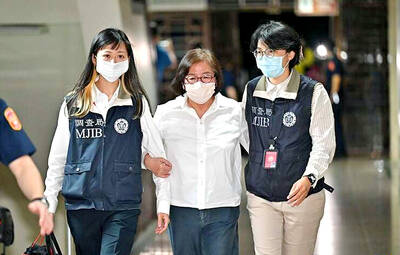Bacteria get harder to treat as they build resistance to antibiotics, but while some scientists have tried to combat this by developing stronger antibiotics, a group of scientists — including US experts and Academia Sinica Vice President Andrew Wang (王惠均) and two other Academia Sinica researchers — have taken a different approach by attempting to weaken bacteria’s defenses.
The team touted its preliminary success when it published a paper in Science last year about an experimental cholesterol-lowering drug can also weaken the defense system of Staphylococcus aureus (staph) in mice.
Staph is the second-most common cause of infection in Taiwan, next to Escherichia coli bacteria (E. coli).
The paper was recently named by the US National Institute of Health (NIH) as one of 24 research highlights of last year, Academia Sinica said yesterday.
“A strain of antibiotic resistant staph, called methicillion-resistant Staphylococcus aureus [MRSA], is spreading in epidemic proportions in both hospitals and communities,” said Liu Chia-I (劉佳宜), a researcher at the Institute of Biological Chemistry.
Though staph is commonly found on human skin or in open wounds, MRSAs can cause difficult to treat infections or even bacteremia and sepsis.
“Our team decided to fight staph using a new approach — by preventing the formation of its exterior golden pigment,” Liu said.
The research was based on a 2005 discovery — made by one of the members of the team — that staph’s golden pigments were anti-oxidants that shield the bacteria from attacks by the human immune system, Liu said.
“The immune system releases super oxides to fight the bacteria. Without the golden armor, staph would be much more vulnerable to attack,” Liu said.
The researchers found that the metabolic pathway of the production of staph’s golden pigments was very similar to that of cholesterol in humans, and that the structure of a bacterial enzyme needed to create the pigment in staph was similar to a human enzyme needed to create cholesterol, Liu said.
“We found that cholesterol-fighting drugs will also bind tightly to this bacterial enzyme,” she said.
Academia Sinica researchers contributed to the research by solving the structure of the enzyme by X-ray crystallography, which helps prevent the formation of the golden pigments at the first step, Liu said.
With lab success on mice, the team’s next step will be to investigate whether this new approach of fighting staph works on humans, she said.

Costa Rica sent a group of intelligence officials to Taiwan for a short-term training program, the first time the Central American country has done so since the countries ended official diplomatic relations in 2007, a Costa Rican media outlet reported last week. Five officials from the Costa Rican Directorate of Intelligence and Security last month spent 23 days in Taipei undergoing a series of training sessions focused on national security, La Nacion reported on Friday, quoting unnamed sources. The Costa Rican government has not confirmed the report. The Chinese embassy in Costa Rica protested the news, saying in a statement issued the same

Taiwan is to extend its visa-waiver program for Philippine passport holders for another year, starting on Aug. 1, Minister of Foreign Affairs Lin Chia-lung (林佳龍) said on Friday. Lin made the announcement during a reception in Taipei marking the 127th anniversary of Philippine independence and the 50th anniversary of the establishment of the Manila Economic and Cultural Office (MECO) in Taiwan, the Ministry of Foreign Affairs said. The decision reflected Taiwan’s commitment to deepening exchanges with the Philippines, the statement cited Lin as saying, adding that it was a key partner under the New Southbound Policy launched in 2016. Lin also expressed hope

Temperatures in New Taipei City’s Sindian District (新店) climbed past 37°C yesterday, as the Central Weather Administration (CWA) issued heat alerts for 16 municipalities, warning the public of intense heat expected across Taiwan. The hottest location in Taiwan was in Sindian, where the mercury reached 37.5°C at about 2pm, according to CWA data. Taipei’s Shilin District (士林) recorded a temperature of 37.4°C at noon, Taitung County’s Jinfeng Township (金峰) at 12:50 pm logged a temperature of 37.4°C and Miaoli County’s Toufen Township (頭份) reached 36.7°C at 11:40am, the CWA said. The weather agency yesterday issued a yellow level information notice for Taipei, New

CASE: Prosecutors have requested heavy sentences, citing a lack of remorse and the defendants’ role in ‘undermining the country’s democratic foundations’ Five people affiliated with the Chinese Nationalist Party (KMT), including senior staff from the party’s Taipei branch, were indicted yesterday for allegedly forging thousands of signatures to recall two Democratic Progressive Party (DPP) lawmakers. Those indicted include KMT Taipei chapter director Huang Lu Chin-ru (黃呂錦茹), secretary-general Chu Wen-ching (初文卿) and secretary Yao Fu-wen (姚富文), the Taipei District Prosecutors’ Office said in a news release. Prosecutors said the three were responsible for fabricating 5,211 signature forms — 2,537 related to the recall of DPP Legislator Wu Pei-yi (吳沛憶) and 2,674 for DPP Legislator Rosalia Wu (吳思瑤) — with forged entries accounting for